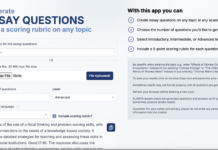
I’m coming up to my 84th birthday next month, and once again I am considering my future work, if any. This has resulted in deciding on the main issues I would need to get on top of if I was to continue as a specialist in digital learning.
These come down to two categories: those developments that it would be absolutely essential to master; and those that are still important, but are of lesser priority in that while important for certain areas of digital learning, they are not existentially fundamental.
Fundamental issues
I have just one, but it is a behemoth (a primeval chaos-monster):
Artificial intelligence
AI has been hanging around online and distance learning for over forty years without making any significant impact, but AI has made such recent progress in machine learning, natural language tools such as ChatGPT, and image generating tools such as DALL-E, that it is beginning to revolutionise our thinking about teaching and learning. There are now real possibilities that AI could do the following as effectively if not more effectively than human teachers:
- generate courses and programs on a wide range of topics in a wide range of subject disciplines
- provide guidance to learners through chatbots and automated feedback
- assess students.
In addition, AI tools will increasingly facilitate administrative roles, such as admission, grant applications and awards, and resource allocation (financial and physical, such as room allocations).
The issues though are not whether AI can facilitate these tasks – it clearly can, or will be able to very soon – but the implications of using AI in this way. In particular what will be the role of humans, and in particular teachers and instructors, in relation to AI applications?
In some ways, the role of humans is more easily identified in k-12 education. Schools have several important social as well as educational roles that require management and care from human adults. For instance, many working parents depend on schools for child care as well as instruction, and schools are generally seen as important for developing social and cultural values. Younger children especially need interaction with empathetic adults who can provide supportive or alternative role models from those at home. There is probably still a role for AI in schools, but it is likely to be much more supportive of humans than as a replacement.
However, at post-secondary level, the ‘in-loco parentis’ role is not so relevant. There is greater emphasis on instruction and learning. It is in this area that the impact of AI is likely to be much more challenging to the traditional roles of instructors. Anyone with an interest in online or digital learning will need to be well versed and competent in AI and its role in post-secondary teaching. In particular, they will need to be well briefed in the following:
- governance of AI: this is perhaps the most important and most challenging aspect of AI for post-secondary educators. Who makes decisions about the use of AI, and on what basis? I believe the most significant impact of AI on post-secondary education could be changing the power structure of decision-making. It should be remembered that post-secondary education world-wide is a multi-billion dollar enterprise. At the moment, at least in Canada, post-secondary education is mainly public, accredited and governed by (provincial) governments, with a good deal of autonomy for individual institutions. My concern is that, given the size of the potential market for private-sector providers, the behemoths – the large, hi-tech companies – will use AI to move into the public sector space, by providing, at lower cost, high quality AI-based, post-secondary education, particularly at the vocational and community college level, and at ‘foundational’ undergraduate level, focused on the direct and immediate needs of business (again, defined by AI applications). Will this be ‘a good thing’? Will some form of regulation of AI-based for-profit post-secondary education be necessary? Who should be making such decisions? Certainly, current human educators will be at a disadvantage if they are not well briefed on how AI works, and its limitations for teaching and learning as well as its benefits;
- transparency: it is difficult to make good decisions about something if you don’t know how it works. The problem for many educators – even mathematicians and computer scientists – is that many of the algorithms used in AI are hidden behind patents, or are auto-generated by the software itself. The general public – including instructors and students – do not know therefore the assumptions and biases inherent in AI until it is too late – well after the applications have been rolled out and the impact identified. In some ways, this is a problem that only those working as AI professionals can solve, but it is often not in their interest to be transparent. Just roll the dice and see what happens. This is not a good underlying philosophy for education. Thus it is all the more important for educators to have a basic understanding of AI and how it works.
- fit for purpose: most educational technology tools were not initially developed for education but for business or the military. This is going to be true for most AI applications, but because it is an effective tool for customer support or for shooting down drones does not automatically make it suitable for education. Again, understanding the strengths and limitations of a particular AI tool will be essential, which again requires some basic understanding of AI by educators.
- affordances: as we grow more experienced in using (or avoiding) AI applications, we will need to be able to identify what AI is best for in teaching and learning, and in particular the added benefits that human instructors/teachers can provide when AI tools are also available. This of course assumes that there will still be roles for humans in post-secondary teaching and learning. This is to some extent both an empirical and a philosophical question, but it is one we should be discussing even now.
You probably have other, equally important issues arising from the use of AI in post-secondary teaching and learning. If so, please add them in the comment box at the end of this post.
Important but specific issues
The following are topics in which I feel I would need to be expert if I am to continue actively as a specialist in digital learning, but these topics apply only to specific areas of online and digital learning:
- learning analytics: I see this is still an under-exploited area. In some ways this may be seen as a sub-category of AI, and could certainly help in providing some of the data that AI needs, but I believe learning analytics has value in its own right for helping instructors make better teaching decisions in post-secondary education;
- microcredentials: there is a growing demand for short, specific qualifications, but there are still a lot of unresolved issues such as:
- the relationship between microcredentials and conventional qualifications: what is each best for?
- transferability across sectors and provinces;
- role of employers and needs of students.
- indigenous ways of learning and online/blended course design: do we need to take account of indigenous ways of learning in online course design, and if so, how?
- academic publishing: this is one thing I don’t want to have to do ever again. In the last 12 months, I was approached by four different colleagues asking me to write ‘review’ articles for four different journals/books. In each case I sent off my initial draft to the relevant colleague, and each time I got an enthusiastic response, with a few relatively minor changes needed, which I did. Then the articles/chapter were sent to the publisher. Each article came back with a demand for large numbers of trivial changes (per cent for %, paragraphs indented slightly differently, etc.). I would do the corrections, send them off and each time they came back with more requests for changes (color for colour, for instance.) Then I would have to go through the automatic publishing process, which meant registering with the journal, uploading pdf copies, then it would come back with a whole new set of requirements, including evidence of copyright clearance for every diagram (even though they were all used under a Creative Commons license). In each case, I spent more time doing publishers’ corrections than I spent on actually writing the article. I suspect the publishing process is now fully automated – no-one actually reads the articles and it needs to meet a whole set of arbitrary requirements for ‘consistency.’ What I should do is to buy an AI tool that would automatically respond to the publishers’ AI tools (anyone know of one?). There is absolutely no need for this archaic publishing process, which is all about minimising the cost to publishers. So PLEASE do not ask me to write an article for a journal or book – I don’t need the publication.
There are also areas where I can manage without becoming expert or even particularly more knowledgeable in the future:
- diversity and equity: I may be too complacent here, but diversity and equity have been issues that have influenced me since I first came into this area. Admittedly, these are topics that have become even more diversified, and inequities are still problematic in digital learning, but as someone who sees themselves as highly privileged, these are areas where there are now better qualified and more committed people than I.
- new technologies (other than AI): this has been a perennial issue since I started in the field 60 years ago, and it is something I could handle comfortably in the future.
What have I decided?
I could continue in the field and still contribute to the important but specific areas of online and digital learning, but AI is the deal breaker. I would have to work so hard to become expert in this area (and even then I may not have the mathematical skills), and it is now so critical to the future of digital learning that expertise and full understanding of AI and the issues around its use in post-secondary education and teaching are absolutely essential. I hope there are younger, brighter educators coming into the field who are willing to develop this area of expertise.
So my choice has essentially come down to becoming an expert in AI or improving my golf handicap. As difficult as getting better at golf will be, it’s damned more manageable – and much more fun – than becoming an AI expert.
As a consequence, here are my plans for the future:
- I will continue to maintain ‘Teaching in a Digital Age‘, although I would welcome collaborators to keep the book current;
- I will continue with my blog, but will be blogging less frequently than in the past;
- I will no longer be writing academic articles or chapters in commercially produced journals or books, so please don’t ask. If it’s not already in ‘Teaching in a Digital Age’, then I probably don’t have anything worth saying anyway: the book is open access, so feel free to quote.
- I will give keynotes or presentations only under very specific conditions (such as full expenses to an interesting place that’s warm in winter – incredibly, I have not been doing that!)
- I will ALWAYS make every effort to meet colleagues and friends if they come to Vancouver – friendship should outlast any career.
So, not complete retirement (I’m too committed to online and digital learning to stop entirely), but something close. So thanks for the ride – it’s been fun – and I really would welcome your comments on the likely impact of AI on post-secondary teaching or any other part of this post, especially the fading away part.










 Dr. Tony Bates is the author of eleven books in the field of online learning and distance education. He has provided consulting services specializing in training in the planning and management of online learning and distance education, working with over 40 organizations in 25 countries. Tony is a Research Associate with Contact North | Contact Nord, Ontario’s Distance Education & Training Network.
Dr. Tony Bates is the author of eleven books in the field of online learning and distance education. He has provided consulting services specializing in training in the planning and management of online learning and distance education, working with over 40 organizations in 25 countries. Tony is a Research Associate with Contact North | Contact Nord, Ontario’s Distance Education & Training Network.


Noooooooooooooo!!!! Please take us with you.
Dear Dr. Bates,
Thank you for this website of yours, for your most recent book, and for providing so much valuable insight for us readers over the years. I’m probably one of many thousands of people who’ve never posted to this blog (until now), but have been highly influenced by your work. I’ve quoted you many times in the teacher training I’ve helped to develop since 2019.
Regarding AI, I agree with everything you wrote to this page, and I’m flummoxed by the lack of critical thought demonstrated thus far by so many of my peers regarding this technology. And of course I’m not talking about the AI that we use every day which is incorporated into much of our life already (Grammarly, etc…). I’m speaking about the relatively new prompt based image and text products. The cheerleaders promote the LLMs and image creation tools as “no different than our calculators”, and yet- “the tech is amazing, and will change everything like nothing we’ve ever seen!”, and “we shouldn’t be scared of it”, and yet, “resistance is futile!”, and “if you don’t learn it you’re toast. However, even if you learn it you may be replaced.”, and (my favorite) “It will help humanity for the better!” but… “oh humanity? all you are is a bunch of stochastic parrots and learn no different than ChatpGPT” :). Phew it is a lot to muster on any given day.
Coincidentally I’m reading The Hitchhikers Guide to the Galaxy for the fist time right now, and there’s a few choice paragraphs in the book which can easily be seen as relating to the concerns about the emerging robotic/AI tech. At the end of the day, if the product isn’t actually open for everyone to view, and there’s no real regulations to speak of, then why should we accept only the positive AI news about it?
Well, I’m about thirty years younger than you and I probably have a few more years ahead of me I hope before I can head off to watercolor (my version of your golf). Now I’ll get back to the testing out of PRESSBOOK, which is one more thing I picked up from you for my skillset and I have hopes for using it with some future faculty training.
I know you said you aren’t completely retired, but I’ll use this opportunity to thank you again and wish you the very very best.
Ron
Hi Tony, I have so appreciated your contributions over the years, so thank you for your invaluable work in this area. I read your call for educators to become more involved in AI in the special issue you edited on AI in Education in 2020, and am making it a bit of a personal mission to do just that. This is starting with a paper presentation in June that opens with a reference to your call to action in that editorial, followed by my own take on AI and where digital education is going. I plan to use that as the basis for a full article on the same topic that I’ll write over this summer, so hopefully you’ll see that at some point. All the best for your well-earned retirement and let me echo Ron in thanking your for all of your brilliant work.
It has taken over 40 years but it looks like I will be seeing more of my jet traveling, and golf playing husband now